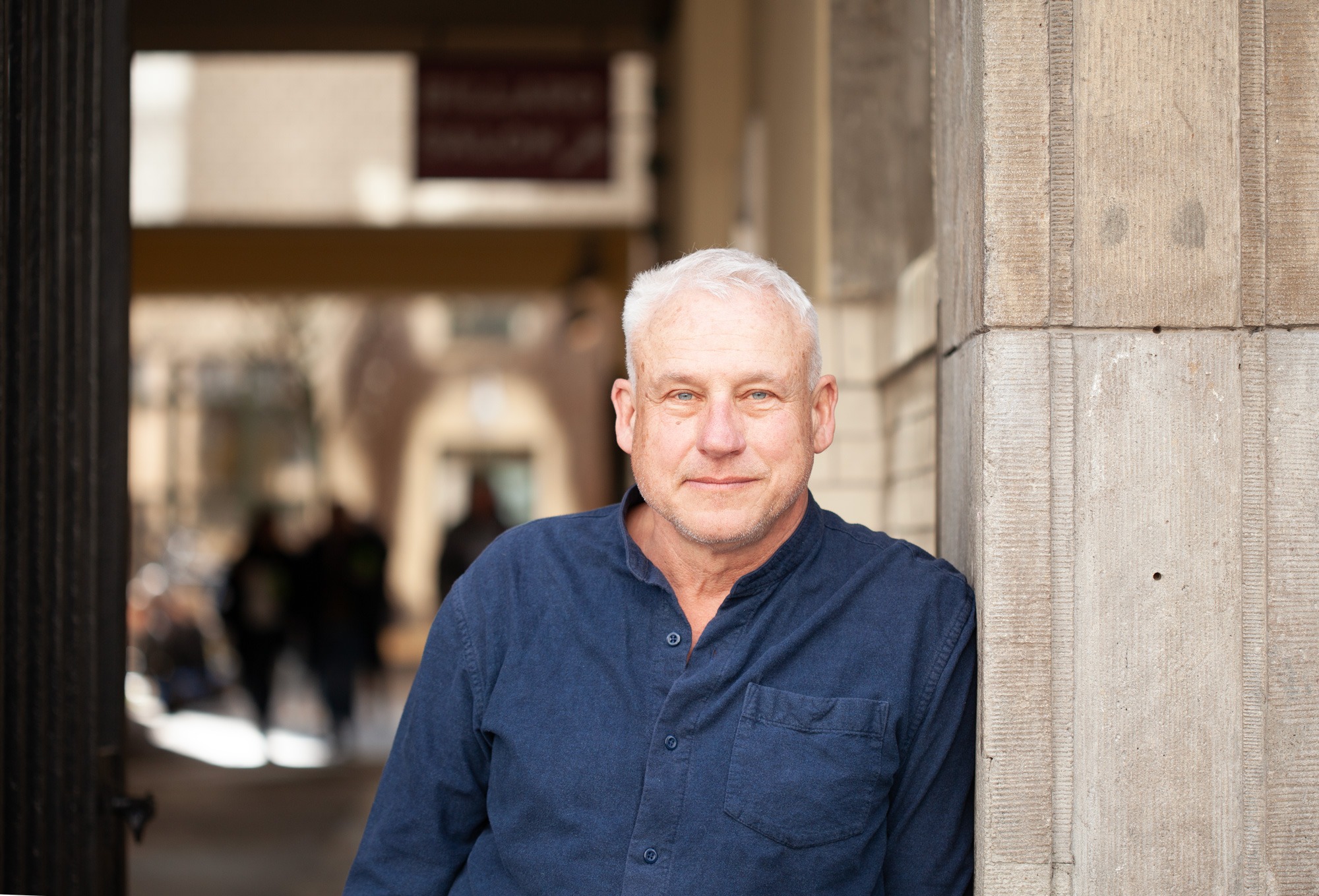Billiards, bars and bees – Steffen Fuchs, owner of the "Köh" salon

Steffen Fuchs has been working in the Hackesche Höfe for 40 years. In the final years of the GDR era, he turned the Sophienclub into a trendy meeting place. His "Köh" salon is a permanent fixture in Berlin-Mitte's now quieter nightlife scene.
The wild days have left their marks. Steffen Fuchs looks into the shop window of the tile manufacturer "Golem" and points to the wooden floor. If you look closely, you can still recognize the black stains of cigarette butts. For 30 years, between 1984 and 2015, this was the home of the legendary "Sophienclub." And Steffen Fuchs was there right from the start.
The son of an oppositional mother, he refused to do his military service in the GDR. Only by a roundabout route did he manage to obtain his Abitur and go to university. But the declining state offered niches that Fuchs skillfully exploited. The cultural scientist became the director of a new youth and music club in Sophienstraße at the rear entrance to Hackesche Höfe.
Stasi dances along: the Sophienclub
Under Steffen Fuchs' management, the Sophienclub quickly developed into one of the most exciting and trendiest meeting places in East Berlin. Designed for just under a hundred guests, up to five times as many people passed through here in one night. Sophienstraße often was impassable due to so many people crowding in front of the entrance. The door policy is strict, it has to be. Steffen Fuchs sorts them personally. Among his guests: Sven Marquardt, today the best-known doorman in the country.
A colorful mix of punks and the Prenzlauer Berg art scene meet at the Sophienclub. West Berliners and soldiers from the occupying forces come here. The Stasi is also there, of course. Fuchs and his two closest associates are to be recruited – without success. The surveillance state is eroding, the scene is becoming rebellious. Fuchs succeeds in getting bands from the West to perform. An East German band is booked. They set up their instruments – and then leave the field to their colleagues. Concerts were an integral part of the program – even though that meant that even fewer guests would fit in. The concerts by local bands are also very popular. The musicians from Rammstein celebrate their first successes at the Sophienclub with "Feeling B."
Photo right: The door of „Golem Baukeramik” was formerly the door of the Sophienclub – guarded by Steffen Fuchs.

Steffen Fuchs becomes increasingly politically active. He organizes political discussions in the Sophienclub, invites a representative of the Jewish community as well as the civil rights activist Bärbel Bohley, and the Russian ambassador reports on "perestroika" in the Soviet Union under Gorbachev. In 1989, Fuchs even gives a speech in the Gethsemane Church and offers the Sophienclub as a meeting place for the opposition. Fuchs remembers with a grin that being arrested was avoided by "revolving moves." The wanted persons swapped flats with each other so that the police never found the ones they wanted to arrest there. As a result, until the end of the GDR Steffen Fuchs got away with two arrests lasting just a few hours.

Fuchs quickly finds his feet in capitalism. Without money, but with plenty of vigor and entrepreneurial spirit, Fuchs gets off to a flying start in the early 1990s. Together with partners, he takes over and expands the Sophienclub, establishes a pub and the "Köh" pool hall.
In earlier times, a textile factory was located on the premises of the "Köh," and later the state dance ensemble of the GDR was managed here. The ensemble's rehearsal stage was also in the Hackesche Höfe, in the rooms of today's Chamäleon Theater.
There were no bank loans; the founders did the remodeling and renovation work with their own hands. Thanks to their polytechnic training at GDR schools, they had a good grounding in the trades. It wasn't all bad.
In addition to his new endeavors, Fuchs also volunteered for the "Hackesche Höfe Society." The organization employs up to 15 people paid through job creation schemes. Together with the Berlin Mitte housing association, it researches former owners and draws up initial plans for the renovation of the run-down monument.
Retreat
At the beginning of the new millennium, when Fuchs is around 40, he leaves the Sophienclub. It continues without him for another 15 years, always running well. But the neighborhood has changed. The neighbors have been getting older and wealthier, they want to live in the middle of the city but also to have their peace and quiet. Constraints and complaints are piling up. The farewell party is held at the turn of the year 2015/2016. Fuchs and many old companions are there.
Fuchs also leaves the pub "Schwarze Pumpe," but keeps his billiard salon. Fuchs is delighted that the pool hall is a sure-fire success and doesn't need advertising. The tables are occupied every evening, billiards is experiencing a renaissance, with many US and South Americans coming in recently.
The "Köh" is also appreciated as a bar. On two or three evenings a week, you can have your drinks mixed there by Fuchs himself. Supported by a long-standing manager, Fuchs has plenty of time for new challenges. He has renovated a farmhouse in beautiful Fürstenberg an der Havel, where he devotes himself to the garden, a meadow orchard and beekeeping. This is more than just a hobby: When he had to close the Köh during the pandemic, his beehives ensured his survival.
Photo left: Steffen Fuchs at the rear entrance of the Hackesche Höfe in the Sophienstraße

Learn more about the Salon "Köh" in this Video with Steffen Fuchs.